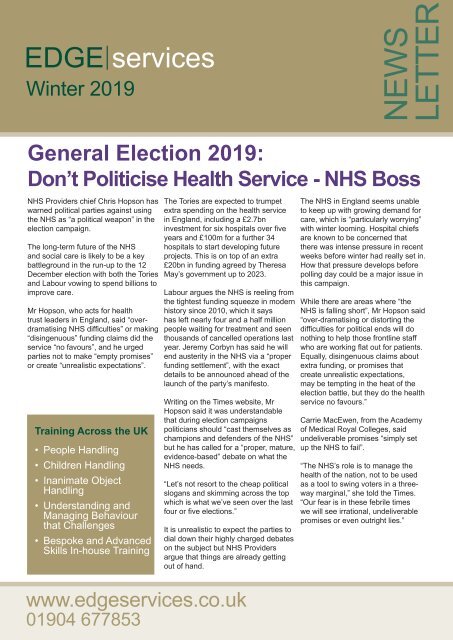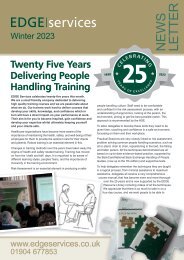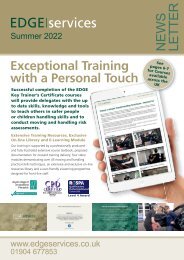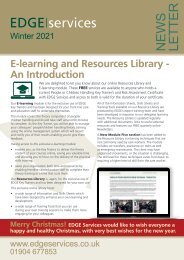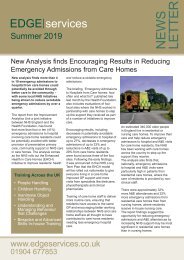EDGE Services Winter 2019 Newsletter
EDGE Services Winter 2019 Newsletter
EDGE Services Winter 2019 Newsletter
- No tags were found...
Create successful ePaper yourself
Turn your PDF publications into a flip-book with our unique Google optimized e-Paper software.
<strong>EDGE</strong> services<br />
<strong>Winter</strong> <strong>2019</strong><br />
NEWS<br />
LETTER<br />
General Election <strong>2019</strong>:<br />
Don’t Politicise Health Service - NHS Boss<br />
NHS Providers chief Chris Hopson has<br />
warned political parties against using<br />
the NHS as “a political weapon” in the<br />
election campaign.<br />
The long-term future of the NHS<br />
and social care is likely to be a key<br />
battleground in the run-up to the 12<br />
December election with both the Tories<br />
and Labour vowing to spend billions to<br />
improve care.<br />
Mr Hopson, who acts for health<br />
trust leaders in England, said “overdramatising<br />
NHS difficulties” or making<br />
“disingenuous” funding claims did the<br />
service “no favours”, and he urged<br />
parties not to make “empty promises”<br />
or create “unrealistic expectations”.<br />
Training Across the UK<br />
• People Handling<br />
• Children Handling<br />
• Inanimate Object<br />
Handling<br />
• Understanding and<br />
Managing Behaviour<br />
that Challenges<br />
• Bespoke and Advanced<br />
Skills In-house Training<br />
The Tories are expected to trumpet<br />
extra spending on the health service<br />
in England, including a £2.7bn<br />
investment for six hospitals over five<br />
years and £100m for a further 34<br />
hospitals to start developing future<br />
projects. This is on top of an extra<br />
£20bn in funding agreed by Theresa<br />
May’s government up to 2023.<br />
Labour argues the NHS is reeling from<br />
the tightest funding squeeze in modern<br />
history since 2010, which it says<br />
has left nearly four and a half million<br />
people waiting for treatment and seen<br />
thousands of cancelled operations last<br />
year. Jeremy Corbyn has said he will<br />
end austerity in the NHS via a “proper<br />
funding settlement”, with the exact<br />
details to be announced ahead of the<br />
launch of the party’s manifesto.<br />
Writing on the Times website, Mr<br />
Hopson said it was understandable<br />
that during election campaigns<br />
politicians should “cast themselves as<br />
champions and defenders of the NHS”<br />
but he has called for a “proper, mature,<br />
evidence-based” debate on what the<br />
NHS needs.<br />
“Let’s not resort to the cheap political<br />
slogans and skimming across the top<br />
which is what we’ve seen over the last<br />
four or five elections.”<br />
It is unrealistic to expect the parties to<br />
dial down their highly charged debates<br />
on the subject but NHS Providers<br />
argue that things are already getting<br />
out of hand.<br />
www.edgeservices.co.uk<br />
01904 677853<br />
The NHS in England seems unable<br />
to keep up with growing demand for<br />
care, which is “particularly worrying”<br />
with winter looming. Hospital chiefs<br />
are known to be concerned that<br />
there was intense pressure in recent<br />
weeks before winter had really set in.<br />
How that pressure develops before<br />
polling day could be a major issue in<br />
this campaign.<br />
While there are areas where “the<br />
NHS is falling short”, Mr Hopson said<br />
“over-dramatising or distorting the<br />
difficulties for political ends will do<br />
nothing to help those frontline staff<br />
who are working flat out for patients.<br />
Equally, disingenuous claims about<br />
extra funding, or promises that<br />
create unrealistic expectations,<br />
may be tempting in the heat of the<br />
election battle, but they do the health<br />
service no favours.”<br />
Carrie MacEwen, from the Academy<br />
of Medical Royal Colleges, said<br />
undeliverable promises “simply set<br />
up the NHS to fail”.<br />
“The NHS’s role is to manage the<br />
health of the nation, not to be used<br />
as a tool to swing voters in a threeway<br />
marginal,” she told the Times.<br />
“Our fear is in these febrile times<br />
we will see irrational, undeliverable<br />
promises or even outright lies.”
2 <strong>Winter</strong> <strong>2019</strong> <strong>Newsletter</strong><br />
Editor’s column<br />
Welcome to <strong>EDGE</strong> <strong>Services</strong>’ winter newsletter. As<br />
you will see there’s been a lot going on and we<br />
have interesting stories about a new treatment for<br />
Alzheimer’s and a very positive piece on arts workshops<br />
at the Belong Care Village in Crewe. (And<br />
then there’s a General Election!)<br />
It’s also lovely to recall <strong>EDGE</strong> <strong>Services</strong>’ small<br />
beginnings 21 years ago and to reflect upon our<br />
growth since then. It’s given me the opportunity<br />
to thank the thousands of delegates who have<br />
attended our courses over the years, but if you will<br />
indulge me (and Christmas is the time for indulgence)<br />
I’d also like to thank the <strong>EDGE</strong> team: our<br />
amazing trainers (past and present) who travel<br />
the length and breadth of the UK (and sometimes<br />
further afield!) delivering training of an exceptional<br />
quality, and our brilliant office team who keep the<br />
whole operation ticking so smoothly with professionalism<br />
and good humour!<br />
It takes both excellent staff and satisfied customers<br />
to build a successful business and it would be hard<br />
to imagine where we might be without you all!<br />
A very merry Christmas and a happy new year to<br />
you and yours from all of us at <strong>EDGE</strong>!<br />
Kate<br />
Kate Lovett<br />
Director<br />
Xmas Presence<br />
<strong>2019</strong><br />
<strong>EDGE</strong> <strong>Services</strong> are delighted to support ‘Xmas Presence’<br />
for the third consecutive year.<br />
This wonderful community project in York helps to<br />
alleviate the sadness of older people who find themselves<br />
alone at Christmas time, by providing transport, a roast<br />
dinner & refreshments, entertainment, presents & good<br />
company for 60 people on Christmas Day.<br />
The Xmas Presence team do this completely free of<br />
charge via donations and volunteers and they need help<br />
to make it work.<br />
They are looking for kind donations for their homemade<br />
hamper gifts – baked, pickled, knitted, crocheted, sewn<br />
– in addition to decorations for the tables on Christmas<br />
Day.<br />
If you are lucky enough to be surrounded by family<br />
and friends at Christmas time, please help to share<br />
the goodness and gratitude a little further by making a<br />
donation.<br />
Information about how to donate or help can be provided<br />
by contacting the Xmas Presence team:<br />
E-mail: xmaspresenceuk@gmail.com<br />
Facebook: @yorkxmaspresence<br />
The Xmas Presence project has inspired other<br />
community groups and care businesses to run their own<br />
festive events for elderly people who would otherwise be<br />
alone on Christmas Day – and we hope to see its reach<br />
grow across the UK because, as the team say, no-one<br />
should have no-one.<br />
Merry Christmas!<br />
<strong>EDGE</strong> services
Council Opens its<br />
First Care Home in<br />
25 years<br />
Liverpool City Council has opened its first council care<br />
home in over 25 years.<br />
The £8m Brushwood care home in Speke has been built<br />
to meet growing demands for dementia care services.<br />
The 60-bed home has 48 beds for long term residential<br />
care and 12 for assessment.<br />
It is the first of two new local authority-built homes in the<br />
city, with the second, Millvina House, opening in Everton<br />
in November.<br />
Kathleen Doyle, 89 is one of Brushwood’s first residents.<br />
Her daughter Carol said she was relieved to have her<br />
mother living in an area “she is familiar with”. Having<br />
regular contact with family and friends and being in an<br />
area she knows “makes so much difference”, she added.<br />
Liverpool City Council spends almost £50m a year on<br />
residential and nursing care, plus a further £11m on<br />
dementia and memory loss services. It has borrowed<br />
money to build the two centres, with the repayments<br />
covered by income from the leases on each site.<br />
Mayor of Liverpool, Joe Anderson, said an increasing<br />
elderly population means the council is facing “a<br />
significant challenge” to ensure the social care system<br />
meets people’s needs.<br />
He said: “The decision to invest in these two new<br />
purpose-built care homes, that will offer residential and<br />
nursing dementia beds and carer respite, is part of our<br />
‘invest to save’ strategy and will help ease pressure on<br />
other, more costly parts of the health service such as<br />
hospital beds, and save the public purse money.”<br />
Brushwood care home is a joint partnership between<br />
Liverpool City Council and Shaw Healthcare who will be<br />
delivering care.<br />
Geraint Evans, Commercial and Development Director for<br />
Shaw Healthcare said the home “provides state-of-the-art<br />
accommodation”, adding: “The team at Brushwood will<br />
take a person-centred approach to care to achieve the<br />
best outcomes for residents. Our goal is to deliver the<br />
type of care that we would want for our own loved ones.”<br />
With many councils closing or selling off their care<br />
homes, Liverpool City Council are very much ‘bucking the<br />
trend’ in their opening of two new homes. If the decision<br />
is a success, and we hope it is, it could mark the start of a<br />
new trend for the care sector.<br />
<strong>Winter</strong> <strong>2019</strong> <strong>Newsletter</strong> 3<br />
Drug Slows Alzheimer’s<br />
A US drug company Biogen claim to have created the first<br />
therapy that could slow Alzheimer’s disease, and say that it<br />
is ready to bring it to market.<br />
There haven’t been any new dementia drugs in over<br />
a decade. Existing drugs currently only help with the<br />
symptoms of Alzheimer’s, there are no drugs that slow its<br />
development.<br />
Biogen are planning to seek to file the paperwork for<br />
regulatory approval in the US in early 2020 for the<br />
“groundbreaking” drug, called Aducanumab. The approval<br />
process could take 1 – 2 years. If successful, the company<br />
aim to offer the drug initially to patients previously enrolled<br />
in its clinical studies.<br />
The announcement is somewhat surprising because the<br />
company had discontinued work on Aducanumab in March<br />
<strong>2019</strong>, after disappointing trial results. Biogen claim that a<br />
new analysis of a larger dataset of the same studies shows<br />
that higher doses of Aducanumab can provide a significant<br />
benefit to patients with early Alzheimer’s, slowing their<br />
clinical decline so they preserve more of their memory<br />
and every day living skills - things that the disease usually<br />
effects.<br />
Aducanumab targets a protein called amyloid that<br />
forms abnormal deposits on the brains of people with<br />
Alzheimer’s. Scientists think these plaques are toxic to<br />
brain cells and that clearing them using drugs would be a<br />
massive advance in dementia treatment, albeit not a cure.<br />
Biogen’s chief executive Michel Vounatsos said: “We<br />
are hopeful about the prospect of offering patients the<br />
first therapy to reduce the clinical decline of Alzheimer’s<br />
disease.”<br />
Hilary Evans from Alzheimer’s Research UK said: “People<br />
affected by Alzheimer’s have waited a long time for a lifechanging<br />
new treatment and this exciting announcement<br />
offers new hope that one could be in sight.<br />
“Taking another look at Aducanumab is a positive step<br />
for all those who took part in the clinical trials and the<br />
worldwide dementia research community. As more data<br />
emerges, we hope it will spark global discussions about<br />
the next steps for delivering much-needed treatments into<br />
people’s hands.”<br />
Prof Bart De Strooper, Director of the UK Dementia<br />
Research Institute at University College London, said: “It<br />
is fantastic to hear of these new positive results emerging<br />
from the Aducanumab trials. We currently have no effective<br />
treatments to slow or halt the progression of Alzheimer’s<br />
disease and I hope this signifies a turning point.”<br />
www.edgeservices.co.uk<br />
01904 677853
4 <strong>Winter</strong> <strong>2019</strong> <strong>Newsletter</strong><br />
Mental Health Sick Leave Rises for<br />
Emergency Workers<br />
New figures suggest that there has been a rise in<br />
emergency service staff requiring time off for reasons<br />
including post-traumatic stress disorder, anxiety and<br />
depression.<br />
Data behind the figures, taken from 57 fire, police and<br />
ambulance services in England, Wales and Northern<br />
Ireland, shows that the overall number of staff who took<br />
time off due to mental ill health rose by a third between<br />
2014 and 2018.<br />
The government said it was funding support for workers to<br />
“counter the stigma” around mental health and that it urges<br />
all workers to “seek help” after traumatic events.<br />
Colm Porter from Unison said the rise may be down to staff<br />
being more willing to seek help with mental health.<br />
Mr Porter said: “Demand on the ambulance service is at an<br />
unprecedented high as GP, mental health and social care<br />
services struggle due to chronic underfunding.<br />
“It’s obviously not good news that so many are suffering,<br />
but the rise in cases does show the taboo surrounding<br />
mental health is lifting, meaning we can begin to assess<br />
the real scale of the problem.”<br />
Figures released to the BBC under the Freedom of<br />
Information Act show:<br />
•More than 5,000 police officers, serving with 29 out of the<br />
UK’s 48 forces, took time off sick for mental health<br />
reasons during 2018-19, compared with just over 4,300<br />
in 2014-15.<br />
•This was 586 fewer officers taking time off in 2018-19<br />
than the year before, however for 16 of the 29 forces it<br />
was the highest number over the five-year period.<br />
•Just over 2,700 ambulance staff took time off at nine of<br />
the UK’s 15 services in 2018-19, compared with just<br />
under 1,700 five years earlier.<br />
•There were 837 firefighters who took time off for mental<br />
health reasons at 19 out of the 49 services in the UK,<br />
compared with 608 in 2014-15.<br />
•More than 365,000 working days were taken off by staff<br />
due to mental health in 2018-19 alone, according to<br />
figures for 56 out of 111 services that were able to<br />
provide that data, up from almost 247,000 in 2014-15.<br />
Author of ‘How to get Outstanding’<br />
Launches New Campaign to Share<br />
Best Practice<br />
Former care home manager and best-selling author<br />
Isaac Theophilos has launched a new campaign to<br />
share best practice.<br />
#missionoutstanding aims to break down barriers<br />
within the care home sector by sharing best practice<br />
across the nation.<br />
Isaac said: “The intention is to spread the excellent<br />
working ideas to share nationally. We want to bring<br />
the sharing of best practices to the next level now.”<br />
Individuals working in care homes are invited to write<br />
800 to 1000-word blogs sharing their best practice<br />
on how an innovative solution has worked for them.<br />
The blog will be emailed to more than 10,000<br />
people working in the care sector and shared widely<br />
on social media. Each contributor will receive a<br />
£50 Amazon voucher for sharing their practical<br />
knowledge.<br />
Isaac added: “The idea can be something simple<br />
or a complex change, but it has to be innovative to<br />
attract and benefit our readers. People can write<br />
about the ideas they have implemented in their care<br />
home that have resulted in positive outcomes for<br />
residents, staff or the community they are serving.<br />
The purpose is to share best practice resulting in<br />
improving the quality of care. People can write on<br />
any aspect of the care home.”<br />
To find out more visit: https://outstandingcarehomes.<br />
co.uk/share-your-care-home-best-practice-2/<br />
A Home Office spokeswoman said: “The government has<br />
funded, and continues to invest in, a number of services<br />
and initiatives to support staff across all three emergency<br />
sectors.<br />
“We are also working to counter the stigma around mental<br />
ill health and encourage those who may need it to seek<br />
help and support.”<br />
<strong>EDGE</strong> services
CONFERENCES, PUBLICATIONS &<br />
EXHIBITIONS<br />
The National Back Exchange Conference: ‘Working Solutions’<br />
23 – 25 September <strong>2019</strong> in Hinkley<br />
The plenary sessions were thought provoking , opening with David Nolan,<br />
Clinical Lead, Staff Physiotherapy Service - Sheffield Teaching Hospitals,<br />
who examined the research regarding back pain and work absence. He<br />
looked at some of the common myths associated with back pain and<br />
discussed conflicting evidence with regards to bending and twisting and<br />
awkward postures.<br />
Various workshops took place throughout the conference. Elizabeth Hallows<br />
sharing her experiences as an expert witness, explaining clearly the<br />
necessity for professionals to carry out and document accurately a robust<br />
risk assessment was an interesting insight.<br />
It was really useful to see so many exhibitors showcasing their latest<br />
equipment. There was great interest in Spectrum’s one-leg stool as well as<br />
their Ergoraiser, which is a truly ergonomic limb raiser and support. Oxford<br />
Joerns and Select Healthcare both showcased new stand aids.<br />
The conference was busy and well attended, and was a perfect opportunity<br />
to discuss questions with colleagues and representatives. The closing<br />
plenary session presented by Alex Ruck Keene, barrister at 39 Essex<br />
Chambers, was a fascinating session entitled ‘Practising Lawfully in Patient<br />
Handling’, he explained clearly the legal framework referencing several key<br />
cases with application to The Human Rights Act and Mental Capacity Act.<br />
In summary the conference proved yet again to meet expectations enabling<br />
professionals to develop skills necessary to practise effectively and safely.<br />
<strong>Winter</strong> <strong>2019</strong> <strong>Newsletter</strong> 5<br />
Forthcoming<br />
Events<br />
20 November <strong>2019</strong><br />
The Independent Care Group<br />
Conference – York Racecourse<br />
https://www.independentcaregroup.<br />
co.uk/conference.php<br />
27 - 28 November 2020<br />
The Occupational Therapy Show -<br />
NEC, Birmingham<br />
https://www.theotshow.com/<br />
10 March 2020<br />
Older People’s Health and Social<br />
Care Conference – London<br />
https://www.kcl.ac.uk/events/<br />
older-peoples-health-social-careconference<br />
17 - 18 March 2020<br />
Dementia Care & Nursing Home<br />
Expo – NEC, Birmingham<br />
http://www.carehomeexpo.co.uk/<br />
Dementia Care – A Behavioural Approach to Manual Handling.<br />
By Melanie Sturman & Bill Varnam.<br />
This is the 6th volume in this<br />
professional series that can be used<br />
in conjunction with The Guide to the<br />
Handling of People book.<br />
The book is written by two<br />
experienced professionals who aim<br />
to guide the reader through this<br />
complex topic of how to positively<br />
assist people who are living with<br />
dementia.<br />
The book is primarily directed to<br />
those formal and informal care<br />
givers/workers who may struggle<br />
with the behavioural challenges<br />
that a diagnosis of dementia may<br />
bring. The book provides theoretical<br />
information to underpin and assist<br />
towards the practical application of<br />
manual handling activities. It guides<br />
the reader towards a proactive<br />
approach in managing care,<br />
particularly if a person’s behaviour<br />
is negatively impacting on the ability<br />
of formal or informal carers/workers<br />
when providing manual handling<br />
assistance and also reinforces the<br />
necessity in understanding and<br />
responding to the holistic needs of a<br />
person living with dementia.<br />
Approximately half the book is<br />
dedicated to assisting the reader in<br />
understanding the complexity of the<br />
topic by proving ‘a toolbox of different<br />
strategies to use throughout the day<br />
to cope with varying levels of function.’<br />
The content is clearly laid out to help<br />
the reader easily navigate through the<br />
book whilst also providing excellent<br />
references to support additional<br />
reading if required. There is a section<br />
that also directs the reader towards<br />
useful organisations. The book has<br />
its roots in two key areas – the first is<br />
that of understanding and managing<br />
behavioural challenges and the<br />
second in the practical application of<br />
manual handling. Informal and formal<br />
carers/workers who support people<br />
living with dementia require special<br />
skills in managing this complex<br />
condition. The book goes a long way<br />
to support a person-centred approach<br />
but also encourages ‘creative<br />
thinking.’<br />
For <strong>EDGE</strong> <strong>Services</strong>’ manual<br />
handling trainers, the most<br />
anticipated part of the book was<br />
the guidance around the practical<br />
application. Techniques are set out<br />
clearly, supported by pictures. It<br />
is useful to have descriptive case<br />
studies to support the practical<br />
application of techniques. One of the<br />
most reassuring aspects of this book<br />
was that <strong>EDGE</strong> <strong>Services</strong> is already<br />
promoting many of the techniques<br />
demonstrated. Apart from some very<br />
useful additional tips and hints, Edge<br />
trainers are already familiar with<br />
the techniques. This is particularly<br />
helpful as over the last few years<br />
organisations have become<br />
increasingly anxious in providing this<br />
type of support.<br />
<strong>EDGE</strong> <strong>Services</strong> are confident this<br />
book will provide a useful resource<br />
for trainers as well as informal and<br />
formal carers/workers alike.<br />
This eagerly awaited book is now<br />
available to purchase at £30.00 from<br />
the National Back Exchange.<br />
www.edgeservices.co.uk<br />
01904 677853
6 <strong>Winter</strong> <strong>2019</strong> <strong>Newsletter</strong><br />
People Handling and<br />
Risk Assessment<br />
Key Trainer’s Certificate<br />
Our flagship course has established<br />
<strong>EDGE</strong> as one of the leading providers of<br />
training to the healthcare and social care<br />
sectors.<br />
Course Overview<br />
This course will provide delegates with<br />
the knowledge, skills and<br />
confidence to train others in the<br />
moving and handling of people and in<br />
the conducting of manual handling risk<br />
assessments.<br />
Who Will Benefit?<br />
This course is for delegates with a<br />
responsibility for health & safety and<br />
welfare of carers and clients with<br />
regards to the moving and handling of<br />
people.<br />
Assessment<br />
Course assessment comprises:<br />
• a one hour ’open-book’ test to<br />
determine delegates’ theoretical<br />
understanding of the course content;<br />
• delivery of a group mini-training<br />
session in order to assess teaching<br />
skills, organisation, and delivery of<br />
appropriate course content;<br />
• a practical skills assessment, which<br />
takes place continuously throughout<br />
the course.<br />
Course Aims and Intended Learning<br />
Outcomes<br />
By the end of the course delegates shall:<br />
• demonstrate a sound knowledge of<br />
legislation and professional guidance<br />
which affects them, their job, their<br />
employers and employees;<br />
• briefly understand the workings of the<br />
spine and how to reduce the risks of<br />
spinal injury;<br />
• demonstrate an appreciation of the<br />
principles of biomechanics;<br />
• demonstrate an appreciation of<br />
ergonomics;<br />
• demonstrate a sound knowledge of<br />
risk assessment;<br />
• demonstrate a sound knowledge of<br />
‘controversial techniques’;<br />
• demonstrate a sound knowledge of<br />
up-to-date practical skills in moving<br />
handling clients in a care setting;<br />
• demonstrate the skills and confidence<br />
to convey manual handling knowledge<br />
and skills to others.<br />
Certification<br />
This course is a Royal College of<br />
Occupational Therapists (RCOT)<br />
Approved Learning Award and is certified<br />
by the CPD Certification Service. Upon<br />
successful completion of this training<br />
delegates will receive a certificate,<br />
endorsed by both accrediting bodies, from<br />
<strong>EDGE</strong> <strong>Services</strong>, in addition to a Level 4<br />
Award from RoSPA Qualifications. Both<br />
certificates are valid for two years.<br />
Forthcoming Public Training Dates Include:<br />
7 - 10 January 2020, York<br />
28 April - 1 May 2020, Birmingham<br />
14 - 17 Jan 2020, Oxfordshire (Banbury) 4 - 7 May 2020, Glasgow<br />
21 - 24 January 2020, London<br />
12 - 15 May 2020, Oxfordshire (Banbury)<br />
21 - 24 January 2020, Glasgow<br />
9 - 12 June 2020, London<br />
4 - 7 February 2020, Exeter<br />
16 - 19 June 2020, Manchester<br />
17 - 20 February 2020, Manchester 23 - 26 June 2020, Brighton<br />
18 - 21 February 2020, Birmingham 21 - 24 July 2020, York<br />
25 - 28 February 2020, Edinburgh<br />
28 - 31 July 2020, Glasgow<br />
3 - 6 March 2020, Glasgow<br />
18 - 21 August 2020, London<br />
10 - 13 March 2020, London<br />
1 - 4 September 2020, Edinburgh<br />
17 - 20 March 2020, Oxfordshire (Banbury) 8 - 11 September 2020, Birmingham<br />
17 - 20 March 2020, Peterborough 15 - 18 September 2020, Exeter<br />
31 March - 3 April 2020, York<br />
22 - 25 September 2020, Glasgow<br />
14 - 17 April 2020, Cardiff<br />
29 Sept - 2 October 2020, Peterborough<br />
21 - 24 April 2020, London<br />
<strong>EDGE</strong> services<br />
Discounts often apply.<br />
Go to<br />
www.edgeservices.co.uk<br />
for details.<br />
Public Training Courses<br />
Forthcoming Dates:<br />
See below for full list<br />
Course Duration: Four Days<br />
For your convenience if you have<br />
small numbers of delegates.<br />
In-House Training Courses<br />
Available in-house across the UK.<br />
Course Duration: Four Days<br />
We can tailor-make this course to<br />
suit your requirements.<br />
Delivered onsite, at a venue<br />
convenient for our clients with a<br />
programme to suit clients’ specific<br />
learning needs.<br />
Course Materials Comprise of:<br />
• A 256 page professionally bound,<br />
full colour course text book.<br />
• A delegate CD ROM containing all<br />
notes, handouts, delegate quizzes<br />
etc that you would need to deliver<br />
your own training courses as well as<br />
an hour long DVD of practical skills<br />
taught.<br />
• A 27 page full colour ‘Ideas’ book<br />
with training tips.<br />
• Access to an exclusive on-line<br />
Resource Library full of useful<br />
information sheets, skills sheets and<br />
training tools.<br />
• Access to an exclusive e-learning<br />
programme designed to cover the<br />
theory content of people handling<br />
training for ‘front-line’ staff.<br />
All the above and more are included in the<br />
course price.
<strong>Winter</strong> <strong>2019</strong> <strong>Newsletter</strong> 7<br />
People Handling and<br />
Risk Assessment Key Trainer’s<br />
Certificate (Refresher/Update)<br />
Public Training Courses<br />
Forthcoming Dates:<br />
See below for full list<br />
Course Duration: Two Days<br />
For your convenience if you have<br />
small numbers of delegates.<br />
In-House Training Courses<br />
Available in-house across the UK.<br />
Course Duration: Two Days<br />
We can tailor-make this course to<br />
suit your requirements.<br />
Delivered onsite, at a venue<br />
convenient for our clients with a<br />
programme to suit clients’ specific<br />
learning needs.<br />
Our flagship course has established<br />
<strong>EDGE</strong> as one of the leading providers of<br />
training to the healthcare and social care<br />
sectors.<br />
Course Overview<br />
In order that trainers keep abreast of new<br />
legislation and developments in manual<br />
handling, <strong>EDGE</strong> <strong>Services</strong> recommend<br />
a ‘Refresher’ course at least every two<br />
years. This course will further advance<br />
delegates’ professional development<br />
and manual handling skills, and provide<br />
the opportunity to trade experience with<br />
others.<br />
Who Will Benefit?<br />
This course is designed for those who<br />
have previously attended the <strong>EDGE</strong><br />
<strong>Services</strong> ‘People Handling & Risk<br />
Assessment Key Trainer’s Certificate’ or<br />
simliar course. Delegates not previously<br />
trained by <strong>EDGE</strong> <strong>Services</strong> will be<br />
required to provide proof of their original<br />
qualification.<br />
Assessment<br />
Course assessment comprises:<br />
• a practical skills assessment, which<br />
takes place continuously throughout<br />
the course;<br />
• informal Q&A throughout the duration<br />
of the course.<br />
Course Aims and Intended Learning<br />
Outcomes<br />
By the end of the course delegates shall:<br />
• have been reminded of, and made<br />
aware of any relevant changes to,<br />
legislation and professional guidance<br />
which affects them, their job, their<br />
employers and employees;<br />
• have been reminded of the principles<br />
of biomechanics and how they can be<br />
applied to the efficient movement of<br />
clients;<br />
• have been reminded of ergonomics as<br />
a means for the reduction of manual<br />
handling injury;<br />
• have been reminded of the importance<br />
of risk assessment;<br />
• have been reminded of the commonly<br />
known ‘controversial techniques’ and<br />
why some manouevres have been<br />
classified as such;<br />
• have had the opportunity to practise<br />
up-to-date manual handling techniques<br />
and to review new handling aids;<br />
• have had the opportunity to assess<br />
practical moves using current<br />
assessment tools.<br />
Certification<br />
This course is a Royal College of<br />
Occupational Therapists (RCOT)<br />
Approved Learning Award and is<br />
certified by the CPD Certification<br />
Service. Upon successful completion<br />
of this training delegates will receive a<br />
certificate, endorsed by both accrediting<br />
bodies, from <strong>EDGE</strong> <strong>Services</strong>, in addition<br />
to an Advanced Level 4 Award from<br />
RoSPA Qualifications. Both certificates<br />
are valid for two years.<br />
Course Materials Comprise of:<br />
• A 256 page professionally bound,<br />
full colour course text book.<br />
• Access to an exclusive on-line<br />
Resource Library full of useful<br />
information sheets, skills sheets<br />
and training tools. Plus all notes,<br />
handouts, delegate quizzes etc that<br />
you would need to deliver your own<br />
training courses as well as an hour<br />
long DVD of practical skills taught.<br />
• Access to an exclusive e-learning<br />
programme designed to cover the<br />
theory content of people handling<br />
training for ‘front-line’ staff.<br />
All the above and more are included in the<br />
course price.<br />
Forthcoming Public Training Dates Include:<br />
28 - 29 November <strong>2019</strong>, Birmingham<br />
10 -11 December <strong>2019</strong>, Brighton<br />
16 - 17 December <strong>2019</strong>, Manchester<br />
18 - 19 December <strong>2019</strong>, Glasgow<br />
7 - 8 Jan 2020, Oxfordshire (Banbury)<br />
14 -15 January 2020, York<br />
16 - 17 January 2020, Glasgow<br />
30 - 31 January 2020, London<br />
4 - 5 February 2020, Manchester<br />
6 - 7 February 2020, Glasgow<br />
11 - 12 Feb 2020, Oxfordshire (Banbury)<br />
13 - 14 February 2020, London<br />
13 - 14 February 2020, York<br />
27 - 28 February 2020, Birmingham<br />
12 - 13 March 2020, Glasgow<br />
17 - 18 March 2020, Cardiff<br />
24 - 25 March 2020, Edinburgh<br />
24 - 25 March 2020, Peterborough<br />
26 - 27 March 2020, London<br />
31 March - 1 April 2020, Exeter<br />
31 March - 1 April 2020, York<br />
2 - 3 April 2020, Oxfordshire (Banbury)<br />
16 - 17 April 2020, Birmingham<br />
30 April - 1 May 2020, Glasgow<br />
12 - 13 May 2020, London<br />
19 - 20 May 2020, Manchester<br />
26 - 27 May 2020, Glasgow<br />
26 - 27 May 2020, Birmingham<br />
28 & 29 May 2020, York<br />
www.edgeservices.co.uk<br />
01904 677853
8 <strong>Winter</strong> <strong>2019</strong> <strong>Newsletter</strong><br />
Children Handling and Risk<br />
Assessment<br />
Children Handling and Risk<br />
Assessment (Refresher/Update)<br />
KEY TRAINER’S<br />
CERTIFICATE<br />
Public Training Courses<br />
Course Duration: Four Days<br />
KEY TRAINER’S<br />
CERTIFICATE<br />
Public Training Courses<br />
Course Duration: Two Days<br />
This four day course<br />
will provide you with the<br />
knowledge, skills and<br />
confidence to train others<br />
in the moving and handling<br />
of children/young adults<br />
and how to conduct manual<br />
handling risk assessments.<br />
24 - 27 March 2020, Birmingham<br />
9 - 12 June 2020, Brighton<br />
6 - 9 October 2020, Birmingham<br />
In-House Training Courses<br />
Available in-house across the UK.<br />
Course Duration: Four Days<br />
This two day Refresher/<br />
Update course will further<br />
advance your professional<br />
development and manual<br />
handling skills, and provide<br />
you with a valuable opportunity<br />
to trade experience with<br />
others.<br />
11 - 12 Feb 2020. Birmingham<br />
16 - 17 June 2020, Brighton<br />
13 - 14 Oct2020, Birmingham<br />
17 - 18 Nov 2020, Birmingham<br />
In-House Training Courses<br />
Available in-house across the UK.<br />
Course Duration: Two Days<br />
We can tailor-make this course to suit<br />
your requirements.<br />
Please call us on 01904 677853 to<br />
discuss your requirements.<br />
We can tailor-make this course to suit<br />
your requirements.<br />
Please call us on 01904 677853 to<br />
discuss your requirements.<br />
Course Accreditations:<br />
Course Accreditations:<br />
For more details please<br />
visit our website www.<br />
edgeservices.co.uk/courses<br />
For more details please<br />
visit our website www.<br />
edgeservices.co.uk/courses<br />
Understanding and Managing<br />
Behaviour that Challenges<br />
KEY TRAINER’S<br />
CERTIFICATE<br />
Public Training Courses<br />
Course Duration: Four Days<br />
Understanding and Managing<br />
Behaviour that Challenges (Refresher/<br />
Update)<br />
KEY TRAINER’S<br />
CERTIFICATE<br />
Public Training Courses<br />
Course Duration: One Day<br />
This four day course<br />
will provide you with the<br />
knowledge, skills and<br />
confidence to train others in<br />
de-escalation and breakaway<br />
techniques, which can be<br />
adopted to deal with individuals<br />
exhibiting challenging<br />
behaviour.<br />
21 - 24 April 2020, York<br />
21 - 24 July 2020, Birmingham<br />
17 - 20 November 2020,<br />
Glasgow<br />
In-House Training Courses<br />
Available in-house across the UK.<br />
Course Duration: Four Days<br />
We can tailor-make this course to suit<br />
your requirements.<br />
Please call us on 01904 677853 to<br />
discuss your requirements.<br />
This one day Refresher/Update<br />
course will further advance<br />
your professional development,<br />
de-escalation and breakaway<br />
skills and provide you with a<br />
valuable opportunity to trade<br />
experiences with others.<br />
20 April 2020, York<br />
20 July 2020, Birmingham<br />
16 November 2020, Glasgow<br />
In-House Training Courses<br />
Available in-house across the UK.<br />
Course Duration: One Day<br />
We can tailor-make this course to suit<br />
your requirements.<br />
Please call us on 01904 677853 to<br />
discuss your requirements.<br />
Course Accreditations:<br />
Course Accreditations:<br />
For more details please<br />
visit our website www.<br />
edgeservices.co.uk/courses<br />
For more details please<br />
visit our website www.<br />
edgeservices.co.uk/courses<br />
<strong>EDGE</strong> services
The Benefits of Arts in Care Homes<br />
This spring, the Belong care village in Crewe organised an eight-week<br />
programme, which involved artists in residence delivering workshops for<br />
residents. The programme was part of three-year project, Where the Arts Belong,<br />
run in partnership with Liverpool’s Bluecoat centre for contemporary arts and Arts<br />
Council England.<br />
The aims of the programme were to assess how to effectively bring art - from<br />
expressive dance to sculpture and storytelling - into care environments.<br />
The outcomes in Belong Crewe were resoundingly positive. Natalie Ravenscroft,<br />
experience coordinator at the village – the first to pilot the programme – said<br />
“Everything improved, from the customers’ mood to their physical health.”<br />
Some 55 of the village’s 67 residents, many of whom have dementia, took<br />
part in the programme, including contributing to creating artworks. Most of the<br />
workshops were highly interactive and encouraged residents to form close<br />
friendships. Ravenscroft described the bond between three residents at the<br />
village, formed in large part because of the activities. “Around the time we started<br />
the project, three individuals moved into the same house,” she said. “Soon,<br />
they were coming to all the sessions together, and would even ask to sit next<br />
to each other.” The effects of these friendships and bonds, adds Ravenscroft,<br />
are incomparable: “It just makes [the residents] happy. It helps them to remain<br />
healthy, both emotionally and physically.”<br />
Ravenscroft adds that it has been particularly touching to see residents take pride<br />
in the work they produced. “It’s really lovely to watch someone be so passionate<br />
about something. For instance, we had one gentleman spend hours just finalising<br />
the detail on a clay sculpture he made,” she said.<br />
In addition to providing a goal and purpose, the workshops also helped residents<br />
to combat memory loss.<br />
London-based artist and filmmaker Suki Chan organised one-to-one voice<br />
recording sessions with residents, asking them about their lives and recording<br />
their responses. In the process, long-forgotten memories were revealed. In one<br />
session, a resident was able to recall her feelings on being evacuated during<br />
the war. “As the story developed, she started adding other, smaller details, like<br />
the name of the lady that took her in. Her brain was building a bridge between<br />
memories and telling the story perfectly. You could 100% see that she was in that<br />
moment.”<br />
The pilot undertaken at Belong Crewe now stands as a prime example of the<br />
benefits that creative workshops can have in care environments. Benefits of the<br />
programme were not limited to residents within the home; they also extended<br />
to relatives who were able to watch their loved ones engage with a new activity.<br />
“You get everything: smiles, amazement, tears … They’re just like ‘oh my god –<br />
look at what mum has made!’” says Ravenscroft. She adds that families would<br />
often join in workshops themselves.<br />
Residents communicated their excitement less explicitly, through smaller albeit<br />
equally significant gestures. “They put their hands on your face and smiled, and<br />
you knew that was their way of saying thank you,” says Ravenscroft. For her<br />
and her colleagues, responses like that were invaluable. “Just that one comment<br />
made a difference. My job as experience coordinator involves a lot of work; it’s a<br />
big role. So it’s good to get such encouragement.”<br />
While Ravenscroft was sad to see the spring arts programme come to an end,<br />
she is confident that the seeds have been sown at Crewe, as both staff and<br />
residents continue to develop the skills they learned. For the residents, these<br />
included sculpture, painting, photo editing and dance. For the staff, it was the<br />
variety of ways art can be used to improve residents’ memories and lifestyles.<br />
“These artists have completely changed our perception of what art can be,” says<br />
Ravenscroft. “Hopefully we can keep sustaining these skills and eventually we<br />
might have permanent artists in residence.”<br />
<strong>Winter</strong> <strong>2019</strong> <strong>Newsletter</strong> 9<br />
Legal Case<br />
CQC Fine two<br />
unregistered providers<br />
£4000 each for providing<br />
services<br />
Two companies that provided<br />
personal care services even<br />
though they were not registered<br />
with the Care Quality Commission<br />
as required by law, have been<br />
fined £4,000.<br />
CQC has issued fixed penalty<br />
notices to both companies – each<br />
based in Freshwater, Isle of Wight<br />
after they admitted providing care<br />
services while unregistered: one<br />
from 5 November 2016 to 23<br />
October 2017 and the other from<br />
18 July 2018 to 17 May <strong>2019</strong>.<br />
It is an offence under the Health<br />
and Social Care Act 2008 to carry<br />
out a regulated activity – in this<br />
case, providing personal care<br />
- without being registered with<br />
CQC.<br />
Joyce Frederick, Deputy Chief<br />
Inspector of Registration, said:<br />
“The law requires all care<br />
agencies to register with the<br />
Care Quality Commission. This<br />
then ensures that all registered<br />
providers are then subject to a<br />
system of monitoring and ongoing<br />
inspection to make sure that<br />
standards are being maintained.<br />
“Providers of personal care<br />
services deal with people whose<br />
circumstances can make them<br />
vulnerable, and who may not<br />
be able to report abuse or poor<br />
care. We do not hesitate to take<br />
further action to protect people<br />
from providers who ignore the<br />
requirements of the law.”<br />
www.edgeservices.co.uk<br />
01904 677853
10 <strong>Winter</strong> <strong>2019</strong> <strong>Newsletter</strong><br />
21 Years of <strong>EDGE</strong> <strong>Services</strong><br />
Kate Lovett, Company Director reflects on<br />
<strong>EDGE</strong> <strong>Services</strong>’ 21st anniversary.<br />
On 5th November 1998, 21 years ago, I delivered <strong>EDGE</strong><br />
<strong>Services</strong> first ever training course to a domiciliary care<br />
agency based in West Yorkshire. Ten, keen to learn<br />
delegates, were all seeing this brand-new collection of<br />
small manual handling aids for the first time including<br />
slide sheets, turntables, bed blocks etc.<br />
It was a time of real change in the care industry. The<br />
manual handling legislation was still in its infancy and<br />
employers were waking up to their responsibilities to<br />
their staff and clients to keep them as free from harm<br />
as possible when undertaking moving and handling<br />
activities.<br />
I remember at least two of the attending delegates<br />
who had worked as care workers for several years had<br />
long-term back problems and could see the benefits<br />
immediately of the equipment I was showing them. Other,<br />
younger delegates said that they worried it would take<br />
too long - a concern all manual handling trainers still hear<br />
regularly to this day!<br />
I recall trying to make the legislation interesting (nothing<br />
has changed much there!) and reeling off some scary<br />
statistics about the prevalence of back injuries among<br />
nurses which had the impact I was looking for from my<br />
delegates - their attention! The practical session was<br />
peppered with lots of questions from delegates and<br />
anecdotes from myself and the time went quickly. At<br />
the end of the session I was very pleased and relieved<br />
to get positive feedback from all those attending. This<br />
domiciliary care agency booked several further training<br />
sessions and became one of our largest clients for some<br />
time.<br />
Shortly after this, <strong>EDGE</strong> embarked on a nationwide<br />
marketing campaign and soon I was delivering training<br />
in Stirling, London, Manchester and even further afield,<br />
which is when we bought other trainers on to help<br />
manage the increasing workload as well as administrative<br />
support to answer the phones and manage bookings.<br />
Things have changed quite dramatically in the intervening<br />
21 years within people moving and handling circles.<br />
Hoists, now a staple of any care organisation, were<br />
infrequently seen 21 years ago. New legislation such as<br />
the Lifting Operations and Lifting Equipment Regulations<br />
and the Provision and Use of Work Equipment<br />
Regulations have come into force tightening up the<br />
requirements to use all equipment safely. Factors such<br />
as ‘single-handed care packages’ and managing the<br />
movement of morbidly obese clients are relatively recent<br />
issues with new equipment being developed all the time<br />
to help.<br />
Special needs schools rarely undertook moving and<br />
handling training in the 1990s but are now more aware<br />
of their own risks and, thankfully, equipment with children<br />
in mind has developed over the years. These schools<br />
do undertake this training now and we are able to take<br />
specific equipment to show them how risks can be<br />
reduced.<br />
The UK economy has boomed and busted in this same<br />
time period also massively impacting on care and<br />
education organisations training and equipment budgets.<br />
It will be fascinating to see how the next 21 years pan out<br />
- will we still be using the same equipment, or will things<br />
have changed dramatically again?<br />
My prediction is that the issues with handling the morbidly<br />
obese clients will lessen but that we will be dealing<br />
with more issues of challenging behaviours as cases of<br />
dementia increase across the world. I think more people<br />
as they age, will be cared for in their own homes, but that<br />
the houses people live in will be smaller and less able to<br />
accommodate mobile hoists so we are likely to see many<br />
more cases of ceiling track or gantry mounted hoists. I<br />
think there will be many more complex care clients being<br />
cared for by one care worker and that new equipment will<br />
be developed to accommodate this change. Only time will<br />
tell as to whether any of these predictions will come true.<br />
In the meantime, I would like to offer a heartfelt thank you<br />
to everybody who has trained with <strong>EDGE</strong> over the past<br />
21 years - there are thousands of you out there, and I<br />
am eternally grateful that you have played a part in this<br />
journey with me.<br />
Best wishes to you all.<br />
Kate Lovett, Director.<br />
2020 Public ‘Key Trainer’ Courses - Time to Book Your Place!<br />
<strong>EDGE</strong> has recently completed our 2020 Public Course<br />
Training Schedule.<br />
With over 100 public courses at 12 locations across the<br />
UK there are plenty of dates and locations to choose from<br />
but remember, places on each event are limited!<br />
<strong>EDGE</strong> services<br />
•‘People’ and ‘Children Handling and Risk Assessment Key<br />
Trainer’s Certificate’ (4 day)<br />
RCOT Approved Learning Awards, CPD Certified and RoSPA<br />
Qualifications Level 4<br />
•‘People’ and ‘Children Handling and Risk Assessment Key<br />
Trainer’s Certificate (Refresher/Update)’ (2 day)<br />
RCOT Approved Learning Awards, CPD Certified and RoSPA<br />
Qualifications Advanced Level 4
<strong>Winter</strong> <strong>2019</strong> <strong>Newsletter</strong> 11<br />
Need to know<br />
Training a Person with Sight Loss<br />
In the care sector we come across a<br />
wide range of staff that need training<br />
and assessing in the workplace<br />
and some of those individuals may<br />
have additional needs such as sight<br />
impairment. As a trainer it would be<br />
useful for you to understand a few<br />
basic principles of how staff with<br />
sight loss commonly communicate<br />
and how you can best assist them to<br />
ensure they get the maximum out of<br />
your training programme.<br />
Preparation<br />
Individuals with a sight impairment<br />
will have different needs and these<br />
should be organised at the outset of<br />
training if effective learning is to be<br />
achieved. Where possible, discuss<br />
the format of your training and ask<br />
the learner, in private, about any<br />
particular requirements they may<br />
need in advance of the start of your<br />
training so that you can get these<br />
ready before the day. Hopefully they<br />
can give you a clear indication of<br />
what is going to help them.<br />
Effective Communication<br />
It is crucial that all those involved in<br />
communication with the learner use<br />
good communication strategies such<br />
as:<br />
•Find out where the best place to<br />
sit will be – for some sight impaired<br />
learners they want to position<br />
themselves at the front of the class.<br />
•Face the sight-impaired person<br />
directly – on the same level and<br />
in good light wherever possible.<br />
•Position yourself where possible so<br />
that the light is shining on your face,<br />
not in the eyes of the learner.<br />
•Do not talk to the person from<br />
across the room – not being able<br />
to see each other when talking is<br />
a common reason people have<br />
difficulty understanding what is being<br />
said.<br />
•Identify yourself – don’t assume<br />
the person will recognise you by your<br />
voice. Name yourself and the person<br />
in question. In a group situation<br />
introduce other people present.<br />
•If you leave the room or after the<br />
lunch break, make sure you identify<br />
yourself and others in the room<br />
again.<br />
•Speak naturally and clearly – sight<br />
loss does not mean loss of hearing.<br />
•Continue to use body language in<br />
the usual way – this will affect the<br />
tone of your voice and give a lot of<br />
extra information to the learner who<br />
is vision impaired.<br />
•Use every day language – don’t<br />
avoid words like ‘see’ or ‘look’ or<br />
talking about everyday things like<br />
watching a video or looking at course<br />
handouts.<br />
•Ask how to best present the course<br />
handouts and other written materials<br />
– course handouts or PowerPoint<br />
slides may be presented in a larger<br />
font, a bold font or on a different<br />
coloured paper/screen to aid vision.<br />
The learner is the best person to<br />
advise you how these should be<br />
presented.<br />
•Never leave a conversation without<br />
saying so – make sure the sightimpaired<br />
learner knows if you are<br />
now talking to someone else by<br />
introducing them by name to the<br />
conversation.<br />
•Know where to position yourself - if<br />
the sight-impaired learner sees better<br />
in one eye than the other, try to make<br />
a point of remembering which eye<br />
is better so that you can position<br />
yourself for maximum sight of you.<br />
•Avoid situations where there will<br />
be loud sounds where possible -<br />
some people with sight loss are<br />
very sensitive to loud sounds. This<br />
reduced tolerance for loud sounds is<br />
not uncommon, if you can avoid this<br />
it can help the situation.<br />
•Use accurate and specific language<br />
when giving practical directions for<br />
example ‘the emergency lowering<br />
button for this hoist is on the lower<br />
left-hand side of the mast’ rather than<br />
‘the emergency lowering button is on<br />
the mast.’<br />
•Have delegates repeat specific<br />
information to you - if you are giving<br />
specific information that is important<br />
and you want to make sure it has<br />
been seen this can be a useful way<br />
to reassure you that the information<br />
has been seen and understood.<br />
•Pay attention to the learner<br />
- a puzzled look may indicate<br />
misunderstanding, tactfully ask<br />
the sight-impaired person if they<br />
understood you or ask leading<br />
questions so you know your message<br />
got across.<br />
•Avoid situations where there is<br />
competing noise this can make it<br />
more difficult for the sight impaired<br />
person to concentrate on what is<br />
being shown them.<br />
In Conclusion<br />
Recognise that everyone, especially<br />
the poor-sighted, has a harder time<br />
concentrating and understanding<br />
when tired, so be mindful of frequent<br />
rest breaks and not overrunning on<br />
your training session<br />
At the end of the training session<br />
discuss with the learner where they<br />
think things have gone well and<br />
where they think they have not done<br />
so well. Identifying what they felt<br />
worked well and what strategies they<br />
used can give them, and you, clues<br />
as to how to improve future training<br />
events.<br />
www.edgeservices.co.uk<br />
01904 677853
<strong>EDGE</strong> services<br />
What Makes Us<br />
Different?<br />
✔ Healthcare Professionals All <strong>EDGE</strong> <strong>Services</strong> Trainers<br />
are nurses, occupational therapists or physiotherapists<br />
with at least ten years clinical experience and at least ten<br />
years training experience in this field.<br />
✔ Fully Accredited All our People and Children Handling<br />
and Risk Assessment Key Trainer’s Certificate courses<br />
are accredited by RoSPA Qualifications to Level 4 or<br />
Advanced Level 4. They are RCOT (The Royal College<br />
of Occupational Therapists) Approved Learning Awards<br />
and are recognised for providing continuing professional<br />
development by the CPD Certification Service.<br />
✔ Compliance with Professional Training<br />
Standards All <strong>EDGE</strong> Manual Handling Key Trainer<br />
events comply with The National Back Exchange Training<br />
Standards (2010); The All Wales NHS Manual Handling<br />
Training Passport and Information Scheme (2010) and The<br />
Scottish Manual Handling Passport Scheme (2014).<br />
✔ Invaluable Training Resources<br />
Professionally<br />
produced, fully illustrated and comprehensive 256-page<br />
course textbook. Plus proposed documentation to assist<br />
and support in onward training delivery, these include:<br />
course agendas, hand-outs, PowerPoint, filmed practical<br />
techniques and tips for staff training and assessing.<br />
✔ On-Line Resources Library<br />
Our training is supported<br />
by an extensive and informative on-line resources library<br />
offering training tips and tools to develop and enhance<br />
onward training.<br />
✔ E-Learning Module<br />
Our training is supported by a<br />
dynamic and user-friendly e-learning module designed for<br />
front-line staff’s use.<br />
✔ Post Training Support Recognising that many<br />
questions from delegates happen after the training event,<br />
our full-time administrative team will put you in touch<br />
with one of our senior trainers to assist you.<br />
Tel: 01904 677853<br />
Email: Follow enquiries@edgeservices.co.uk<br />
us on:<br />
/Edge<strong>Services</strong><br />
Web: www.edgeservices.co.uk<br />
@<strong>EDGE</strong>handling<br />
<strong>EDGE</strong> services<br />
01904 677853<br />
enquiries@edgeservices.co.uk<br />
<strong>EDGE</strong> edgeservices.co.uk


